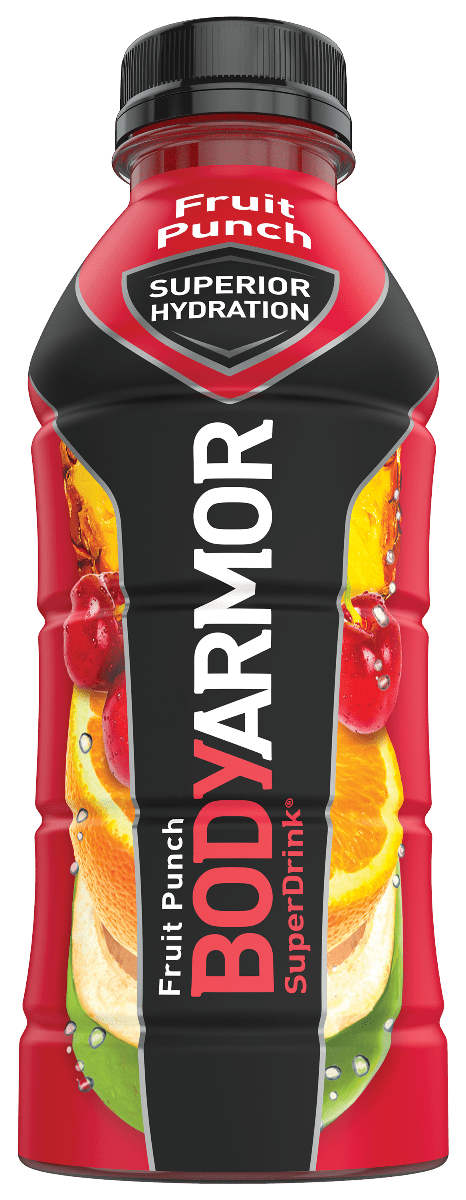

The brand counts Naomi Osaka, Megan Rapinoe, Mike Trout and Dustin Johnson among ‘Team BodyArmor’.Ĭoca-Cola took a minority stake in BodyArmor in 2018, tucking it into its Venturing and Emerging Brands (VEB) portfolio and setting out ‘a path to ownership under defined terms’. It also has BodyAmor Lyte Sports Drinks – which contains the same nutrients as BodyArmor but is naturally sweetened and with 20 calories and 3g sugar per serving.īodyArmor SportsWater, meanwhile, is an alkaline premium sport water with pH 9+, while BodyArmor Edge is boosted with 100mg caffeine. The brand was created in 2011 by Mike Repole and Lance Collins (who were joined by the late Kobe Bryant as the #3 shareholder in 2013) positioned as a premium sports drink with no artificial colors or flavors and containing potassium and other electrolytes, vitamins and coconut water. PepsiCo and Coca-Cola, therefore, dominate the market accounting for an 81% share together (and a 91% share if BodyArmor was included).īut Coca-Cola is also focusing on up-and-coming sports drink BodyArmor.

Gatorade takes the largest share of the US sports drinks category at 67.7%, followed by Powerade at 13.7% and BodyArmor at 9.3% (Euromonitor figures for 2020). I think we can leverage that trust in providing much more than just a liquid hydration.” The power of Powerade. And I think that's the real future of Gatorade, which is a massive brand that has so much trust from consumers. “We provide solutions, we provide products and we provide information.
Armor drink full#
“But where we see the biggest opportunity for Gatorade is in creating more of a personalized solutions for athletes and kind of amateur athletes, like most of us, and creating a much more engaged relationship where we become advisers of the athletes, of their hydration needs, of all their nutrition needs and we see an opportunity to create much more of a full ecosystem of engagement with the consumer. Obviously, moving into other spaces - natural, energy - those could be spaces," he said in the company's FY2020 earnings call in February. “As we think about the future of Gatorade, we couldn't be more excited about what we see. Innovation: Zero and personalizationĭesigned to draw back lapsed Gatorade consumers who have concerns over sugar, Gatorade Zero has proved to be an ‘amazing innovation’, according to CEO Ramon Laguarta, with the brand now reaching an estimated $1bn retail sales value in 2020.īut in 2021, it’s personalized solutions that the CEO is most excited about. PepsiCo’s beverage division suffered early on in the pandemic with the key convenience channel shut off, but by October Laguarta was optimistic about trends for the sports drink category, seeing more people exercising, and embracing daily routines of exercising at home : “That helps the sports drink category and obviously Gatorade as a leader in that category.”Īnd leader it is, with the brand taking a chunky 67.7% share of the US sports drink market. Yet the brand has also moved with the times: such as with the brand’s organic launch in 2016, the debut of Gatorade Zero in 2018, and innovations such as a smart cap to give athletes direct hydration feedback on their personal smart cap vessels.Īnd in pandemic times, the drink is resonating with consumers, as health and wellness takes top priority and exercise becomes a point of focus, according to PepsiCo CEO Ramon Laguarta. PepsiCo’s Gatorade has a legacy of some 50 years: presenting itself as ‘the most scientifically researched and game-tested way to replace electrolytes lost in sweat’. Zero sugar and personalized innovations have been driving the category forward while both companies see the potential of the sports category appeal to a wider audience and tap into increased emphasis on health and wellness as a result of the pandemic. Packaging & Packing Materials, Containers.Processing Equipment & Systems, Automation, Control.Filling & Packaging Equipment & Systems.


 0 kommentar(er)
0 kommentar(er)
